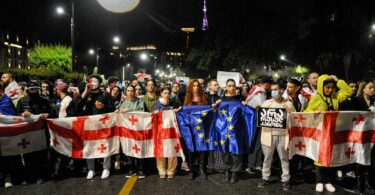
GLASGOW, Scotland – School children from all over Scotland attended a televised BBC debate Thursday on the issues surrounding the fast-approaching September 18 independence referendum.
More than 7,000 pupils attended the event at Glasgow’s premier arena, the SSE Hydro.
BBC News’ Scotland Correspondent James Cook moderated the debate, which followed a number of similar debates which have taken place in several Scottish cities with voters predominantly aged over 18.
One of the largest to involve young people on such a wide scale, the political
debate in Glasgow saw an equal number of Yes and No voters pose their questions to four of the nation’s most well-known political figures. A significant number of undecided voters also attended.
debate in Glasgow saw an equal number of Yes and No voters pose their questions to four of the nation’s most well-known political figures. A significant number of undecided voters also attended.
 As the campaign trail enters its final week, students at the debate asked about issues which will directly affect them and their families.
As the campaign trail enters its final week, students at the debate asked about issues which will directly affect them and their families. Both campaigns are going to great lengths to sway voters. Recent polls have shown that the result is simply too close to call.
This year, 16 and 17-year-olds will vote for the first time.
Aiden Halliday, 17, a pupil of Wallace Hall Academy, in Dumfries in southwest Scotland, will vote for the first time next Thursday.
“It was great to be right in the front rows of political history, and to be able to
hear from the politicians at the forefront of this huge discussion,” Halliday said.
hear from the politicians at the forefront of this huge discussion,” Halliday said.
Kaine Bray, 16, also a pupil of Wallace Hall Academy, spoke positively about the experience.
“It was an incredible opportunity for all the young people in Scotland to take part in the political process,” said Bray. “I thoroughly enjoyed taking part in the debate and I was very pleased to see a number of nationally renowned political figures giving us the information we need to make an informed decision on something which will affect us for the rest of our lives.”
At the debate, Deputy First Minister Nicola Sturgeon, a Scottish Parliament member, represented the pro-independence Yes Scotland campaign along with Patrick Harvie, who is co-convenor of the Scottish Green Party.
On the other side of the debate, under the Better Together slogan, were Scottish Conservative Party Leader Ruth Davidson, a member of the Scottish Parliament and Respect Party Member of Parliament George Galloway.
Pupils listened to the arguments and questioned the politicians on a wide range of issues surrounding job security, university tuition fees, the possibilities of increased powers for Scotland in the event of a No vote, and the currency which an independent Scotland would adopt.
Sturgeon keenly promoted a Yes vote, saying that independence would allow Scotland to put bold left-wing policies in place and that it would end contradictory right-wing governments, saying: “How many times has Scotland voted Labour to only end up with the Tories?”
Sturgeon also said that a Yes vote would enable Scotland to make decisions for itself, by itself.
“Voting Yes puts controlling the future of our own country into our own hands. We’ll have control of our own resources,” said Sturgeon. “It’s what all independent countries do, and it’s what Scotland should do as well.”
But Davidson argued differently, hailing the security and stability of the status quo.
“We have huge control over our health care, education and our policing,” said Davidson, adding that Scotland is part of a £63 million market. “We can be a better country without being a separate country.”
Whatever the outcome, many young Scots are pleased that their votes will count towards Scotland’s future next Thursday.
Robert Guthrie is a Senior Reporter for Youth Journalism International.
***
Your tax-deductible contribution can help support this nonprofit at



